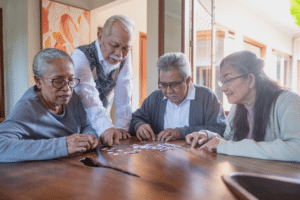Elsa felt that she had never actually been alone before the day that Thomas was buried. They had been married for over 40 years, together even longer, and even through his sickness over the last five years, she felt that closeness, that bond with her husband. He had been dying for a long time, but then suddenly it was all at once, and leaving the church, she felt the unfamiliar and choking weight of loneliness. Their adult children tried to comfort her, but they were wrapped in the cloaks of their own sorrow, and she felt isolated. She felt true loss.
For an older adult, death of a spouse or partner may trigger a multitude of losses. The primary loss is that of a partner, lifelong companion, and trusted friend. Grieving is experienced both physically and emotionally — grieving people often cry easily and may have trouble sleeping, express little interest in food, have difficulty concentrating, and may not be able to make sound decisions. Surviving spouses often experience health consequences as a result of grief and bereavement, some of which can be life-threatening. Some researchers suggest that the odds of mortality during the first three months of post-widowhood were significantly higher than for people who were continuously married.
In addition to dealing with loss, a grieving spouse or partner also needs to come to terms with their new reality. For the first time — perhaps in decades — the surviving spouse is alone. To grieve and continue with one’s own life is hard work, and some people respond more quickly to healing than others. If the grieving person is relatively healthy and has friends and family, the intense pain of grief will lessen over time, and there will be more “good” days than “bad.” But if the intense grief persists for many months, this can be a sign of depression or anxiety, and you may want to talk with your doctor.
Without the person who was always by your side, it’s easy to feel lost in the world. But it’s important to remember that you aren’t. There are people to talk to, including family members, grief counselors, and support groups. Even if it feels like your world has fallen away, there are ways to help you remain standing while facing your grief.
Facing the Biggest Fears of Losing a Partner
If you’ve lost your spouse or partner after years of being together — or even if you’ve only been together a short time — it’s inevitable that your life will change, possibly in dramatic ways. While it’s understandable to want to avoid the difficult process of changing, facing your fears will ultimately better equip you to navigate your grief.
After losing their spouse or partner, many older adults face these common fears as part of the grieving process:
- A change in independence. We all know someone who has lost a spouse who did everything for the household. They were fine when they had each other, but suddenly, the person serving as the primary caretaker is gone. This can reduce the independence of the surviving spouse which can add to the pain of loss. In this case, children or other relatives may be able to help, even if they live far away. There are also services — like those we offer at the Institute on Aging — that can offer home care support so that you can continue to live independently.
- Having to cope with new tasks. Thomas had done all the cooking before he died, and while he had tried to teach Elsa, their running joke was that she was hopeless at it — if he ever left, she’d be eating cereal. Every longtime partnership has these kinds of tradeoffs. For someone who is suddenly alone, learning new tasks is a vital part of maintaining independence and fighting through sorrow. Rather than feel ashamed about something you don’t know, it’s important that you feel empowered to ask questions and learn new skills, whether in classes, online communities, or just by asking someone close to you.
- Feeling without a place. In some long-standing couples, identity becomes wrapped up in the other person. You’ve always been together, it seems, and even if you’re an independent person, suddenly doing activities that you used to do together can be painful. Often, when this happens, people who’ve lost a spouse start to ignore former obligations and social callings, falling into isolation. This is dangerous and can lead to depression, other illnesses, or accidents.
- Slipping into depression. This is fearfully easy for an older adult who is feeling alone, cut adrift, and facing the idea of their own mortality. Signs of depression include forgetfulness, irritability, anxiety, weight loss, and perhaps most crucially, apathy. If you are experiencing this, you may be experiencing depression. This is a sign that you should talk to someone, whether a family member, friend, or professional.
Getting Help to Move through Grief
Remember: you are not alone. Losing a spouse or partner might make the world feel both suffocatingly small and overwhelmingly large at the same time. Assumptions about your world have changed. The plans that you had for a future together such as traveling together, taking classes, or becoming community volunteers won’t happen. These losses, although not nearly as significant as the death itself, need to be acknowledged and grieved. The loss of intimacy and affection also need to be recognized and grieved. These are normal feelings. Sorrow is normal.
It’s a bad idea to ignore the sadness or bottle it up and try to deal with it yourself. Talking to someone can be the first step to processing your grief. To do this, you have a few options to choose from:
Family and friends. The first choice, obviously, is family members and friends. These are the people who know you best, to whom you can turn to without needing to explain. But they might be caught up in their own lives or dealing with their own grief. As psychologists explain, you have to pick your audience. Even among loved ones, there are people who won’t be able to help you for any number of reasons. Finding the right person and being honest with them — and letting them be open and honest, too — is the best way to create a meaningful dialogue. Remember that well-intentioned family members or friends may be unable to connect with you and your feelings of loss. For many grievers, people whom they counted on to be there for them disappear because they simply cannot tolerate your expression of deep pain. If you feel that talking with family isn’t enough or that their help could be supplemented with professional support, that isn’t a judgment on anyone.
One-on-one counseling. There are several types of professional grief counseling services. The first, the one we all know, is with a trained professional in a one-on-one setting. One-on-one counseling can take place in your home or at the office of a therapist, and many licensed clinicians specialize in bereavement therapy. For older adults living in the Bay Area, IOA can help connect you with a therapist.
Group counseling. We also recommend group grief counseling for older adults. In group sessions, you’ll talk to people who are going through the same thing and share experiences to help come to terms with your own grief. At IOA, we offer a variety of group counseling options, including an 8-week traumatic loss grief group, as well as an advanced traumatic loss grief group. We also offer drop-in grief support groups, either monthly or on Saturday mornings. We believe that people should deal with grief in a timeframe that makes sense for them, and we want to accommodate your needs.
Phone hotline. If you’re not ready for one-on-one or group support, you can always find a friend to talk to on IOA’s Friendship Line. The Friendship Line offers emergency services but also provides a warm voice for people who just want to talk. We have 24-hour staff whose training and professionalism are matched only by their compassion. Sometimes you just want someone who will listen, and the Friendship Line can be that outlet whenever you need it.
After your partner dies, it might seem strange that the world refuses to stop turning even though everything has changed. It feels unfair that life moves on. But it does, and it needs you to move with it. There will be a hole in your heart for the rest of your life. You don’t have to be ashamed of it or feel pressured to get over it, but you do have to keep walking, keep facing life, and learn how to live in your new reality. Luckily, you don’t have to do it alone. With the help and understanding of family, friends, and counselors, you can start to find your bearings in a new life.
If you’ve lost a partner or spouse, or known someone who has, contact us to learn more about individual and group services for grief counseling at the Institute on Aging.







